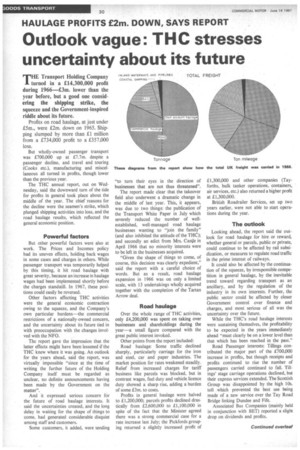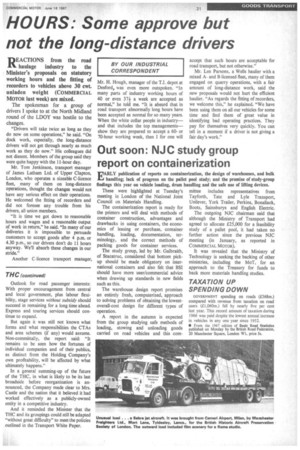HAULAGE PROFITS E2m. DOWN, SAYS REPORT
Page 32

Page 33

If you've noticed an error in this article please click here to report it so we can fix it.
Outlook vague: THC stresses uncertainty about its future
rTHE Transport Holding Company turned in a E14,300,000 profit during 1966—£3m. lower than the year before, but a good one considering the shipping strike, the squeeze and the Government-inspired riddle about its future.
Profits on road haulage, at just under £5m., were £2m. down on 1965. Shipping slumped by more than fl million from a £734,000 profit to a £357,000 loss.
But wholly-owned passenger transport was £700,000 up at £7.7m. despite a passenger decline, and travel and touring (Cooks etc.), manufacturing and miscellaneous all turned in profits, though lower than the previous year.
The THC annual report, out on Wednesday, said the downward turn of the tide for profits in general took place about the middle of the year. The chief reasons for the decline were the seamen's strike, which plunged shipping activities into loss, and the road haulage results, which reflected the general economic position.
Powerful factors
But other powerful factors were also at work. The Prices and Incomes policy had its uneven effects, holding back wages in some cases and charges in others. While passenger transport was temporarily helped by this timing, it hit road haulage with great severity, because an increase in haulage wages had been implemented shortly before the charges standstill. In 1967, these positions could easily be reversed.
Other factors affecting THC activities were the general economic contraction owing to the squeeze, and the Company's own particular burdens—the commercial restrictions of a nationally-owned concern, and the uncertainty about its future tied in with preoccupation with the changes involved with the NFO.
The report gave the impression that the latter effects might have been lessened if the THC knew where it was going. An outlook for the years ahead, said the report, was virtually impossible "since at the time of writing the further future of the Holding Company itself must be regarded as unclear, no definite announcements having been made by the Government on the matter".
And it expressed serious concern for the future of road haulage interests. It said the uncertainties created, and the long delay in waiting for the shape of things to come, had generated considerable disquiet among staff and customers.
Some customers, it added, were tending "to turn their eyes in the direction of businesses that are not thus threatened".
The report made clear that the takeover field also underwent a dramatic change in the middle of last year. This, it appears, was due to two things: the publication of the Transport White Paper in July which severely reduced the number of wellestablished, well-managed road haulage businesses wanting to "join the family" (and also inhibited the attitude of the THC); and secondly an edict from Mrs. Castle in April 1966 that no minority interests were to be left in the businesses acquired.
"Given the shape of things to come, of course, this decision was clearly expedient," said the report with a careful choice of words. But as a result, road haulage expansion in 1966 was on only a limited scale, with 13 undertakings wholly acquired together with the completion of the Tartan Arrow deal.
Road haulage
Over the whole range of THC activities, only £4,200,000 was spent on taking over businesses and shareholdings during the year—a small figure compared with the great public interest invoked.
Other points from the report included: Road haulage: Some traffic declined sharply, particularly carriage for the iron and steel, car and paper industries. The market position for rates weakened steadily. Relief from increased charges for tariff business like parcels was blocked, but in contrast wages, fuel duty and vehicle licence duty showed a sharp rise, adding a burden of some £3m. to costs.
Profits in general haulage were halved to £1,200,000; parcels profits declined drastically from £2,600,000 to £1,100,000 in spite of the fact that the Minister agreed there was a strong commercial case for a rate increase last July; the Pickfords grouping returned a slightly increased profit of £1,300,000 and other companies (Tayforths, bulk tanker operations, containers, air services, etc.) also returned a higher profit at £1,300,000.
British Roadrailer Services, set up two years earlier, were not able to start operations during the year.
The outlook
Looking ahead, the report said the outlook for road haulage for hire or reward, whether general or parcels, public or private, could continue to be affected by rail subsidization, or measures to regulate road traffic in the prime interest of railways.
It could also be affected by the continuation of the squeeze, by irresponsible competition in general haulage, by the inevitable trend toward regarding transport as an ancillary, and by the regulation of the industry in its own interests. Further, the public sector could be affected by closer Government control over finance and charges, and most serious of all was the uncertainty over the future.
While the THC's road haulage interests were sustaining themselves, the profitability to be expected in the years immediately ahead "must clearly be on a lower level than that which has been reached in the past."
Road Passenger interests: Tillings contributed the major part of the £700,000 increase in profits, but though receipts and profits continued to rise the number of passengers carried continued to fall. Tillings' stage carriage operations declined, but their express services extended. The Scottish Group was disappointed by the high 10s. toll which prevented the best use being made of a new service over the Tay Road Bridge linking Dundee and Fife.
Associated Bus Companies (mainly held in conjunction with BET) reported a slight drop on dividends and profits.
Outlook for road passenger interests: With proper encouragement from central and local government, plus labour flexibility, stage services without subsidy should succeed in remaining for a long time ahead. Express and touring services should continue to expand.
But again it was still not known what forms and what responsibilities the CTAs and area schemes (if any) would assume. Non-committally, the report said: "It remains to be seen how the fortunes of individual companies and of their publics, as distinct from the Holding Company's own profitability, will be affected by what ultimately happens."
In a general summing-up of the future of the THC, in what is likely to be its last broadside before reorganization is announced, the Company made clear to Mrs. Castle and the nation that it believed it had worked effectively as a publicly-owned entity in a competitive industry.
And it reminded the Minister that the THC and its groupings could still be adapted "without great difficulty" to meet the policies outlined in the Transport White Paper.




































































































































